In Memoriam: Dave Wildt
David E. Wildt
January 15, 2020
A cow is not a cheetah. Yet against all odds, the fate of this iconic cat will be forever tied to a farm boy from Chandlerville, Illinois whose would-be career as a livestock husbandry scientist took a wild turn 40 years ago. David E. Wildt, renowned scientist and conservationist, died at his home on January 15, 2020, surrounded by his family. He was 69.
Wildt retired as the Director of the Smithsonian’s Conservation Biology Institute’s Center for Species Survival in December 2018. A seminal leader in conservation biology, his prolific breakthroughs in reproductive biology and population genetics benefitted wildlife enormously. Wildt established genome resource banks and developed ground-breaking assisted reproductive technologies for giant pandas to name just one of more than 50 endangered species. His scientific legacy includes more than 300 scientific papers and mentorship and training of hundreds of graduate and post-doctoral students, and colleagues around the world.
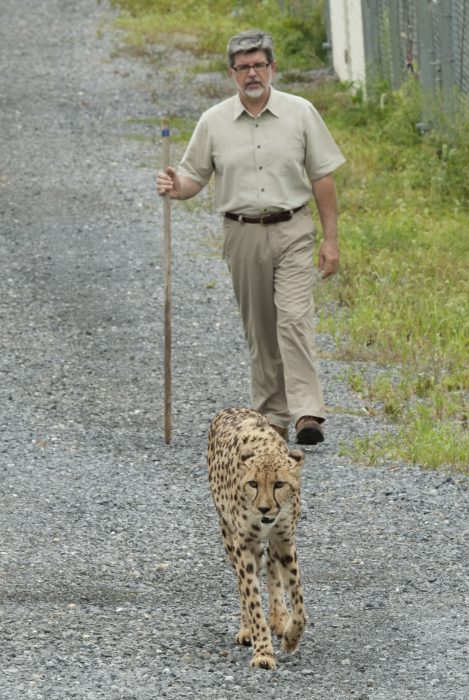
Dave Wildt taking a walk with a cheetah in 2011. (Photo by Mehgan Murphy)
Wildt’s early pioneering work on the cheetahs led to the creation of the New Opportunities in Animal Health Sciences (NOAHS Center) in 1988 fostering interdisciplinary collaboration among the National Zoo, the National Institutes of Health, and the National Cancer Institute, with the mission to promote the health, genetic diversity, and reproduction of endangered species in zoo and wild populations.
In 2005, he was one of the founding visionaries to establish the Conservation Centers for Species Survival, now based in Texas. This unique consortium was born out of an urgent need for science-driven programs and greater collaboration between facilities managing critically endangered species and private landowners. To date, these Conservation Centers have helped save some of the world’s rarest animals, from the black-footed ferret to the cheetah, giant panda, Florida panther, Scimitar-horned oryx and others dependent on large tracts of land to thrive.
In 2017, Wildt received the Smithsonian Institution’s Distinguished Scholar Award in the Sciences. He also received scientific achievement awards from Illinois State University, the American Association of Zoo Veterinarians, and the Association of Zoos and Aquariums.
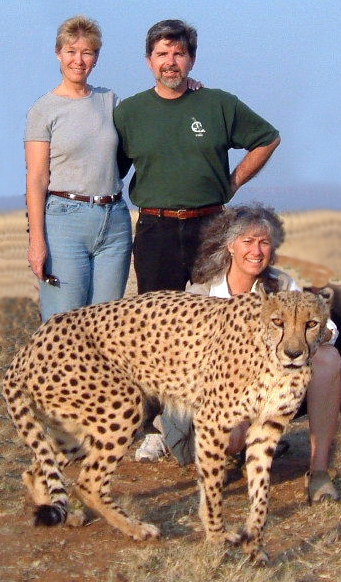
From left, Susie Ellis, executive director of the International Rhino Foundation, Dave Wildt, and Laurie Marker, director of the Cheetah Conservation Fund, a research partner of the National Zoo, in Namibia. (Photo courtesy David Wildt, as published by the Torch, July 2008)
In 1994, Wildt married fellow conservationist Susie Ellis, executive director for the International Rhino Foundation. Their vital collaboration continues to impact the conservation of numerous wildlife species. But, it was the human species that brought Wildt his great joy. He is survived by daughter Chelsea Taft, her husband Beau and grandsons Noah and Jackson, as well as stepsons Zachary Joseph (wife Cassie), and Maxwell Joseph (wife Stephanie), and granddaughter Everett as well as numerous treasured academic colleagues. He also is survived by his mother, Louise Wildt, brother Alan Wildt (wife Margaret) of Virginia, Illinois, and their three children. Wildt and Ellis are canine parents to Ivy La Fleur (IVF), a female from the first litter of dogs birthed in 2015 via in vitro fertilization. Wildt’s SCBI team partnered with researchers at Cornell University to successfully use in vitro fertilization to produce live, healthy domestic puppies from cryopreserved (frozen) embryos.
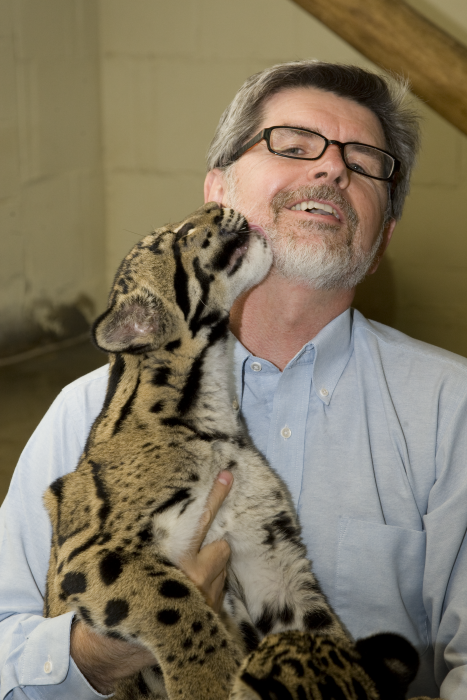
Dave Wildt enjoys a kiss from a clouded leopard. (Photo by Mehgan Murphy, 2009)
The mechanical darling of Wildt’s eye was his prized 1950 John Deere A tractor, a family heirloom. He realized a lifetime dream of driving it across Michigan’s Mackinac Bridge in 2018. Wildt savored quiet summer afternoons wandering around his beloved Shenandoah Valley acreage, ensuring that the property was pristine. Another passion was orchestrating annual elaborate July 4th firework displays at the annual family gathering on the family farm in Illinois. He was a founding member of “Men at Meatloaf,” a group of six cherished friends who meet religiously at the Strasburg Diner on Tuesday nights for dinner.
Wildt was born and raised in rural Illinois. Cherishing his farm heritage, Wildt grew up on a family livestock and grain farm with many pets and participated in 4-H and Future Farmers of America. Wildt was married to Brenda Baldwin in 1970 through 1985 and remained friends. He received his bachelor’s degree in animal science from Illinois State University in 1972 and his master’s degree in animal husbandry from Michigan State University in 1973. Wildt also completed his doctoral studies at Michigan State University, studying physiology and animal husbandry under the supervision of eminent primatologist Dr. Richard Dukelow.
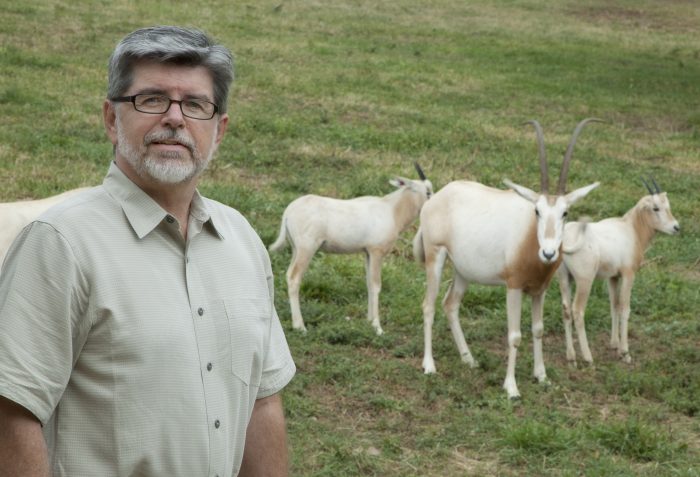
Dave Wildt with a group of scimitar-horned oryxes at the Smithsonian’s Conservation Biology Institute. (Photo by Mehgan Murphy, 2011.)
Wildt will be buried in Walnut Ridge Cemetery in Virginia, IL, in his family plot. A memorial service and celebration of his life will take place later this spring in Strasburg, Virginia. In lieu of flowers, a fund will be established to host thought leaders at SCBI and continue the mentoring that was so important to Dave.
Wildt is remembered as an insatiable worker, eminent scientist, highly ethical leader, caring mentor, farm-boy at heart, and a loving father and husband.
Dave was a true conservation hero and had an exceptional career at the Smithsonian. The word “pioneer” is too often overused, but Dave literally pioneered the discipline of zoo and wildlife reproduction—increasing our knowledge of the fundamental biology of species, and developing and implementing new tools and technologies that now represent the standard of practice for all world-class zoos today.
Losing Dave at this point in his life is nothing short of a tragedy. Ideas and ‘directions’ continued to pour forth as he transitioned from leading the Center for Species Survival to retirement as Scientist Emeritus at the end of 2018. And he was full of plans for tackling difficult conservation challenges that would have kept him busy for many years to come.
When faced with the loss of someone we care deeply about, we seek solace in the fact that the person will live on our memories—memories today that have flooded back to me like a tidal wave. As with so many, Dave saw something in me many years ago that perhaps I did not even see in myself. He provided me with an opportunity for and an expectation of success that fueled my professional career. Dave made every challenge seem surmountable, and he had a knack for making everyone around him believe that they could make a difference in achieving our collective mission of saving species. I owe him much, and I know that legions of people in our own organization and around the world feel the same.
Steve Monfort
John and Adrienne Mars Director,
Smithsonian’s National Zoo and Conservation Biology Institute
We invite friends and colleagues to share their own memories of Dave Wildt in the comments below.
Posted: 16 January 2020

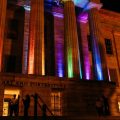
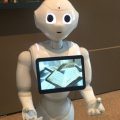





My heartfelt condolences to Susie, their children and extended family and friends. I only had the pleasure of meeting Dave once, at a zoo conference in Australia where he led a workshop discussion on the benefits and practicalities of setting up genome resource banks. In my eyes he was already a hero for the amazing work he’d done on cheetahs and it was nice to find he was such a nice, genuine human being. It was this workshop that stimulated the establishment of a cryobank at Auckland Zoo and our involvement in the Frozen Ark project. This is just one tiny part of his legacy which I know reaches many other corners of the world. May you rest in peace Dave knowing you leave behind a body of work well done and many others to continue it.